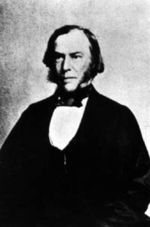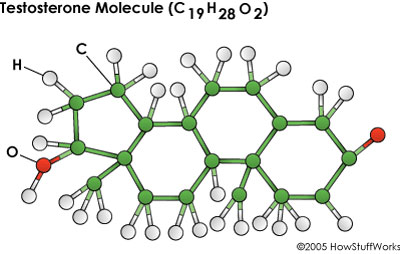Chemistry of Testosterone Discovery and Synthesis Historical Significance
Steroids in professional sports
-congressional hearings
-asterisks in the record books
-who to blame?
Impact on the youth
-role models
-high school use
Medicinal Use

Chemistry of Testosterone Discovery and Synthesis Historical Significance
Steroids in professional sports
-congressional hearings
-asterisks in the record books
-who to blame?
Impact on the youth
-role models
-high school use
Medicinal Use
Categories: Testosterone
Back to Chemistry of Testosterone
The main function of the androgen receptor is to transcribe DNA into m(essenger)RNA which regulates gene expression.
Categories: Testosterone
Categories: Testosterone
Categories: Testosterone
Introduction to Testosterone Chemistry of Testosterone Future
Historical Significance Discovery and Synthesis

-Scientists in the 1930s discovered that anabolic steroids could facilitate the growth of skeletal muscle in laboratory animals
-This breakthrough led to abuse of these compounds by bodybuilders and weightlifters and then by athletes in other sports.
Adminstering Anabolic Steroids
-orally, injected intramuscularly, or rubbed on the skin when in the form of gels or creams
-these drugs are often used in patterns called cycling, which involves taking multiple doses of steroids over a given time period, stopping for a period, and then beginning again.
-Users combine several different types of steroids in a process known as stacking; the belief is that a variety of steroids will produce an effect on muscle size that is greater but side effects will be decreased
-pyramidding an another common practice in which the user takes the highest level of steroid in the middle of a cycle and then decreases servings towards the end of the cycle
The effects
Addictive Nature
-User can become psychologically dependent long before he or she becomes physically dependent
-Withdrawal symptoms including: headaches, lethargy and depression are common
Steroid Law
-Anabolic steroids are Class C drugs that can only be prescribed by a doctor.
-Importation of steroids is legal as long as they are only for personal use
-Importation with the intent to distribute is punishable by up to 14 years in prison
Categories: Testosterone
Ruzicka Butenandt
Butenandt and G. Hanisch published a paper describing “A Method for Preparing Testosterone from Cholesterol.”
Ruzicka and A. Wettstein, announced a patent application in a paper “On the Artificial Preparation of the Testicular Hormone Testosterone.”
Their independent partial syntheses of testosterone from a cholesterol base earned Butenandt and Ruzicka each a share of the 1939 Nobel Prize for Chemistry.
Categories: Testosterone

Near the end of his life, he made and injected an elixir that was a liquid extract made from the testicles of guinea pigs and
dogs. Brown-Sequard said his formula increased his physical strength and intellectual prowess, relieved his
constipation, and even lengthened the arc of his urine.
Categories: Testosterone
Introduction to Testosterone Chemistry of Testosterone Discovery and Synthesis Anabolic Steroids
Cruel Male Leaders
Did heightened testosterone levels contribute to history’s villains?
Napoleon Complex
-The Napoleon complex is named after French Emperor Napoleon Bonaparte. Napoleon overcompensated for his short height (lack of testosterone) by seeking power, war and conquest.
Baby Boom
-The “golden age of testosterone reseach” coincides with the increase in newborn’s between 1946 and 1964
-Testosterone was synthetized as a fertility drug
Categories: Testosterone
Introduction to Testosterone Chemistry of Testosterone Historical Significance
Prehistory and Religious Doctrine
-Jewish Circumcision
-Egyptian Fertility Statues found in pyramids
The Middle Ages
-Human Castration
-Serendipitous Discovery that the Testes effect behavior, emotion and overall health
1849-Arnold Berthold
-experimentation of castration on chickens
1889-French Physiologist, Charles Edouard Brown-Sequard
“Rejuvenating therapy for the body and mind”
1918- Leo L. Stanley, resident physician of San Quentin State Prison in California
transplanted testicles removed from recently executed prisoners into inmates: some of whom claimed that they recovered sexual potency
1927- Fred C. Koch, University of Chicago’s Professor of Physiologic Chemistry
In 1927, Koch and his student, Lemuel McGee, derived 20mg of a substance from a supply of 40 pounds of buffalo testicles that, when administered to castrated roosters, pigs and rats, remasculinized them.
1934- Ernst Laquer
purified testosterone from bovine testicles
1935- Adolph Butenandt and Leopold Ruzicka
-funded by pharmaceuticals research labs in Germany and Switzerland respectively, joint synthesis
-the two share the 1939 Nobel Peace Prize
The early 1930s 1950s “The Golden Age of Steroid Chemistry”
Research proved that this newly synthesized compound — testosterone — was a potent multiplier of muscle, strength, and wellbeing.
Categories: Testosterone
Introduction to Testosterone Discovery and Synthesis Historical Significance
References The Future of Testosterone

-Carbon atoms have four bonds to other C-atoms, to H-atoms, or to O-atoms
-Of the 19 C-atoms in testosterone, all but 2 lie in the “skeleton” of the molecule.
-Three hexagonal (6) C rings and one pentagonal (5) C ring are fused together at the carbons to a form a framework called an androstane skeleton.
-Most of the C-C bonds are single bonds however testosterone has one Carbon=Carbon double bond and there is one Carbon=Oxygen double bond found in the left corner of the above figure.
-dotted versus solid depth indicators represent the “trans” feature in which the points of fusion between rings alternate between an atom sticking up and an atom sticking down
 <!–[endif]–> -the fourth bond at these points is not necessary to maintain the framework of the skeleton and in testosterone it is occupied by Hydrogen-atoms or by methyl groups (CH3-group). The Trans ring fusions make the steroid skeleton more rigid and allows only minor movements at the ends of the arrangement.
<!–[endif]–> -the fourth bond at these points is not necessary to maintain the framework of the skeleton and in testosterone it is occupied by Hydrogen-atoms or by methyl groups (CH3-group). The Trans ring fusions make the steroid skeleton more rigid and allows only minor movements at the ends of the arrangement.
The effects of testosterone in mammals occur by way of two main mechanisms:
1) By activation of the androgen receptor
2) By conversion to estradiol and by activation of certain estrogen receptors.
Categories: Testosterone